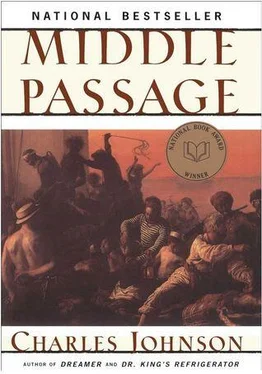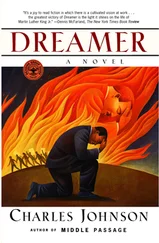Then—
Miraculously, the wind shifted to the old quarter, the storm passed away, and we were through it as though it all had been a conjurer’s trick. The ship labored back on course, the spell broken, though still the Atlantic thundered. Half the crew ran to the grog room and proceeded to get drunk. Our one Moslem on board dropped to his knees, banged his head on deck hard enough to break bone, and wept, “Inshallah! There is no Majesty and there is no Might save in Allah!” However that might be, three younger lighthands, too frightened to move, lost the power of speech and looked stupefied at the vacant stations where their lost mates had stood. Entangled in the twisted rigging above hung three bodies upside down. Matthew McGaffin, the boatswain, a pig-jawed former circus strong man with a walrus mustache, black eye patch, and a big, hectoring voice, swore the storm proved the ship was cursed by its black chattel and internal cargo. Nathaniel Meadows, shaking, one fist in his mouth to stanch a scream, fouled his breeches. Twice. Without speaking, we all clapped our hands together as one company — thirty-two sopping-wet cutthroats black-toothed rakes traitors drunkards rapscallions thieves poltroons forgers clotpolls sots lobcocks sodomists prison escapees and debauchees simultaneously praying like choirboys, our heads tipped, begging forgiveness after this brush with death in Irish, Cockney, Spanish, and Hindi for a litany of collective sins so long I could not number them. Besides, I was too busy peeking through my fingers and promising God I would be good forever if He would quit playing games like that one. Had it lasted a bit longer, we knew, the ship would have been torn to pieces. More: such storms induced madness in seamen; triggered acute appendicitis, respiratory attacks, and suicide in their aftermath — the sorts of gales you tell your grandchildren about, if you live to see them, when they visit on holidays. Yet, standing hard by me, watching the dripping crew cross themselves and offer their first-born whelps to the priesthood, staring with a calm, distant gaze, was the quiet, catfooted Ngonyama. He was dry. Not a drop had touched him. He was coolness itself. Like actors I’d known in New Orleans (all unemployed), he had the unsettling ability to stare at you, or deliver a long speech, without once blinking his eyes or looking away. Maybe this was a trick he’d cultivated, but it struck me that he’d known the storm was coming, and I flinched, afraid of him, as he caught me by my sleeve, and said in his cracking, high-register version of English:
“Lay yourself forward or below tomorrow at noon.”
“What?”
“If you have any friends on this ship”—he glanced at Baleka, who refused to release the fingers on my left hand—“tell them to lay below too.”
He was gone before I could draw sense out of him. After he left to join his tribesmen below, I stayed for a time by the gunport, the girl’s grip on me stronger than before. “We’ll be all right,” I said, though I didn’t believe a word and was troubled by what Ngonyama, that crafty bastard, had told me, and furious at the cryptic tone he used sometimes. Really, when he talked like that, with a wink in his voice, it put me in a mind to clobber him with a caulking iron for his own good. “Universal Native,” I’d call it, the high-flown, inscrutable way whites made the Cherokees talk in dime novels, or the Chinese in bad stage plays. It certainly wouldn’t serve him well back in the States, or endear him to the slave lords who awaited him in Louisiana. Nonetheless, his warning bothered me. I half believed him; half I did not. But we had only a few hours or so of daylight before the impenetrable darkness of the ocean sank over us. Accordingly, the skipper was lashing the crew to make repairs—“You men get aloft!”—hauling them one by one to their feet to secure all the sails with spare gaskets. “And keep a bright lookout.” Others to report on damages below, and double-breech the lower decks. And still others to make fast the boats and haul unnecessary cargo — but not his prized crate — to the rail and pitch it over to lighten us. Erewhile, his lighthands went feverishly to work at the pumps, but their hearts were hardly in it; they worked nervously, waiting for the sea to throw its next seizure. A few deck hands talked of quitting the ship, taking to the remaining boats, and abandoning the blacks who — the boatswain claimed — had caused this troublesome gale and boiling sea to turn us back to Bangalang.
“Steady up there,” said Cringle icily when he overheard them. “And you can stow that kind of talk right now. The captain says he’ll haze any man that tries to leave the ship.”
“Then”—the boatswain spat inches from the mate’s boot; he pushed his low-crowned black hat back on his head, its ribbon hanging over his left eye—“we’re dead already.”
“Maybe you didn’t hear me, McGaffin!”
Cringle’s right hand touched the owlhead pistol in his waistband. The boatswain only exhaled, then spat again, this time hitting the mate’s leg. “You’re the one who kin stow it, Cringle — or shove it mebbe, and that self-servin’ rummy Falcon too, cose water was me woman before you was in long pants, and I know trouble when I see it. Them niggers is weird. A tribe of witches and strangelings. They kin do things. And if you ain’t noticed, sir, there’s water under the keelson, one of the bloody winches is broken, sir, and the hand pumps are chokin’ up. You’re as good a shipmate as ever put a hand to sail, Mr. Cringle, I don’t doubt that, but sometimes I think you come to be quartermaster by crawling through the cabin-house window instead of through the hawseholes like the rest of us. God almighty, man, any tar on board’ll tell you the skipper can’t get this rotten piece of driftwood home — he’ll drown the lot of us — and it’s your business, I’m sayin’, to put things right before it’s too late. D’you know what I’m arstin’ you to do? D’you have enough skin for it? Cose if you’re too fish-hearted to do what you promised, some of us who’ve had enough will do it. See if we don’t!”
Cringle could not reply. This list of problems stole the mate’s wind. He looked flustered and put out, his lips pressed in hard. Like that, he spun away. Me, I had business of my own to tend to in the galley, and perforce hurried below, Baleka hanging onto my dripping shirttails like a barge in tow.
By nightfall Squibb and I had the galley in “shipshape,” if you’ll pardon the expression. The steward was feeling pleased with himself. Actually, he was probably squiffy from the genial influence of a tot of rum. Baleka had finally fallen to sleep in a corner, and the cook and I were on our knees, swabbing and squeegeeing when McGaffin, peeling off his oilskin coat, came through the hatch, followed by Cringle and five men as grim as any I’d seen, the terror of the storm still upon them. I saw their boots first as they slid past me, dirtying the floor. Silently, they took seats on the benches as a jury might, or men come for a hanging. I noticed immediately they were armed with cutlasses, knives, ship’s tools easy to convert to bludgeons. McGaffin sat on the edge of the galley dresser, a little higher that way than the rest, his big hands with curly black hair on the backs folded on his hips. Cringle closed the door, the quietest of clicks as wood kissed metal. Squibb dried his hands slowly on his apron, rose up on one knee, then the other, and gave me a glance, his whole air saying Careful! as he filled a mug of tea for each of them. “Illinois, I think mebbe yuh should leave.”
“No,” said Cringle. “We need every man we have here.”
“Do we now?” McGaffin paused with the mug just below his mouth. “Every man, I’ll agree, but this one ain’t no sailor, he’s a stowaway, remember? A workaway. I been watchin’ him since you found him in the longboat. I didn’t see him sign any articles. He ain’t got no stake in all this.”
Читать дальше












